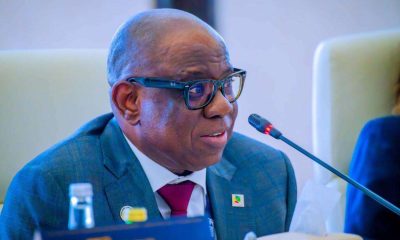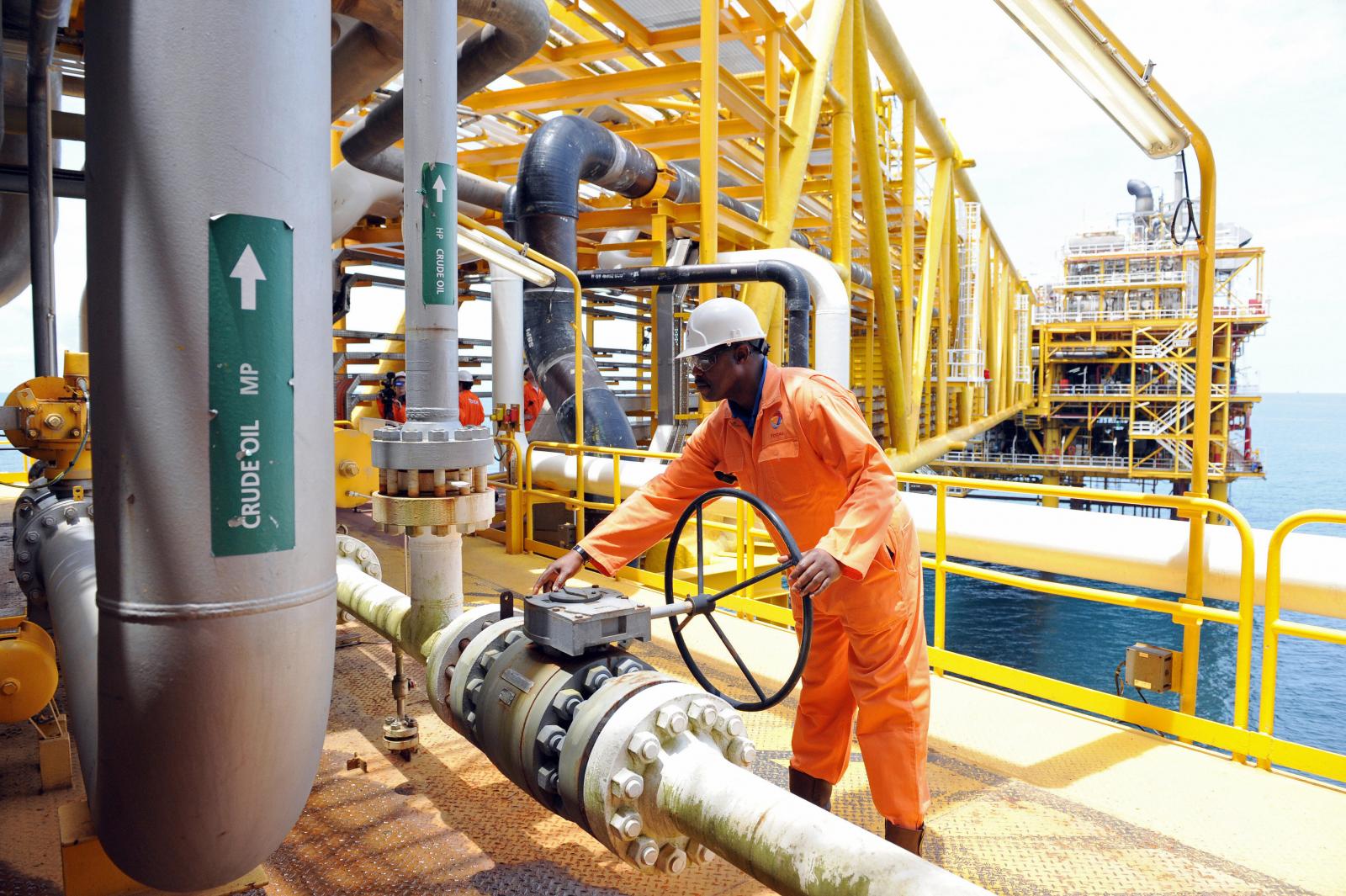Business
2020 budget: Experts project 45% fall in revenue

…doubt impact of stimulus package
By JULIUS ALAGBE
The recent developments in the global economy have continued to wreak havoc on governments and individuals finances. Also, governments from different countries have acted to support economic pillars from falling as both COVID-19 and oil price war bite harder on the economies.
In Nigeria, analysts are concerned that the government has been lagging in providing support and stimulus for the economy to cushion the devastating effects of the virus. They argued that without a sufficient relief for the economy the damage may be irreparable afterwards given the fragile and sluggish state of the economy since exiting recession in 2017.
Cardinalstone Partners, an investment banking firm said policy responses to the recent development in the economy is likely to provide calming effects. However, the firm held that stimulus packages value at 2% of GDP may not be weighty enough to offset potential shocks from the current crisis.
In addition to its six initial policy response to the COVID-19, the CBN also announced ₦1.1 trillion stimulus to support local manufacturers, boost import substitution. Cardinalstone believed that soothing measures could help manufacturers cover important obligations.
It added that this can help keep plants running to meet domestic demand without inordinately raising prices to account for the rising cost of raw materials.
Recently, the CBN devalued the naira by adjusting its FX intervention rates at investors and exporters window to ₦380 to a dollar. Also, it sold to Bureau de Change (BDC) at ₦378/$ in response to Nigeria’s weakening external position and buffers. Again, at the official window, the naira was also repriced lower to about ₦360/$ from ₦307/$. This has resulted in a narrower spread between the official and rates in other FX market strata.
Elsewhere, the CBN revealed plans to activate the ₦1.5 trillion Infrastructure project and redirect oil & gas dollar sales to itself instead of the NNPC.
“The former is expected to boost infrastructure while the latter is aimed at ensuring continued funding for petroleum imports and supporting the new policy on fuel price modulation, analysts held.
These policy responses are likely to provide a calming effect, the investment banking firm explained. It said the measures to support pharmaceutical and healthcare companies are positive given the global shutdown and panic buying of pharmaceutical products domestically. Analysts at the firm said that measures to boost liquidity and economic activities may lead to some pressures on the naira, which has been well sold in the last two months.
It explained that the CBN intervention in February was $2.1 billion and $1.8 billion in March.
“These pressures, and continued moderation in oil prices, are likely to offset gains from the mild naira devaluation implemented by the CBN”, the firm held.
Though, FX rates across the Investors & Exporters Window and BDC markets are now priced closer to the long-run real effective exchange rate of ₦382/$.
Cardinalstone believes its fair value estimate of about ₦437.20/$ better captures the realities of sustained double-digit inflation and twin deficits across fiscal and current accounts. The narrowing of FX spreads across the currency markets could imply CBN’s growing acceptance of the need to reprice the currency.
The FX rate narrowing is to reflect the state of fundamental variables in challenging periods, analysts added. The investment banking firm had expected MPC to slashed policy rate with 50 basis points. It had stated the monetary policy rate (MPR) scarcely dictates yield movements in Nigeria.
“The MPC is likely to use it as a signalling tool for the second time in less than twelve months”, Cardinalstone had projected.
Though the Committee maintained policy rates, analysts had expected reduction in MPR by 50 bps to 13% and, possibly, expand differentiated CRR net to encourage bank lending.
Fiscal intervention
Also, analysts at Cardinalstone position is that fiscal intervention may be needed to stimulate demand.
“As part of measures to prevent a meltdown of the Nigerian economy, we anticipate more fiscal responses from the Federal Government. These measures are likely to complement already announced monetary policy initiatives and fiscal drives.
“In our view, CBN’s stimulus which is about 2.1% of GDP may not be weighty enough to offset potential shocks from the current crisis”, analysts held.
Analysts think significant stimulation of consumption and direct intervention in healthcare from the fiscal authorities may be more impactful on households. For instance, we believe the direct reduction of PMS Price to ₦125/litre from ₦145/litre, to reflect the fall in oil prices, could lead to cost savings and higher consumption for consumers in coming months.
Other than this, “we see other plausible fiscal initiatives likely to be rolled out”, as analyst held that budget review could mean record fiscal deficit in 2020. Federal Executive Council recently approved a ₦1.5 trillion cut to Nigeria’s 2020 budget amid the recent crash in oil prices to $20/barrel levels. The government also revised its oil price benchmark to $30.00/bbl from $57.00/bbl, while leaving its oil production target unchanged at 2.18 million barrels per day (mbpd).
Cardinalstone stated that the resultant reduction in oil revenue and projected non-oil revenue cut may result in a 45% decline in budgeted revenue for 2020. As a reaction to the recent developments, government expenditure was reduced by ₦1.5 trillion after capital expenditure projection was cut by 20.0%.
Then, recurrent expenditure was surprisingly slashed by 25.0%. For us, the budget review was a necessity given recent oil price shocks. However, we believe that the government is still likely to underperform its revenue target for two reasons, analysts at the investment banking firm said.
“Firstly, we see significant risks to oil production forecast of 2.18 mbpd as deep offshore production of about 40.0% of Nigeria’s oil production may be disincentivized if prices remain around current levels of $20/barrel against an average upstream production cost of $30/barrel.
“Secondly, we believe that the initial budget overestimated potential revenue from other non-oil sources such as FGN balances in special levies account, FGN share of the actual balance in special accounts, and Signature bonus/Renewals revenue”, Cardinalstone said.
MPC Bucked Trend
The Monetary Policy Committee (MPC) of the Central Bank of Nigeria (CBN) in its recent meeting bucked the world central bankers’ policy trend by holding policy rates amid COVID-19. The Committee unanimously voted for a hold of the policy rates, as CBN waits to see how the recent stimulus packages would impact the economy.
All the policy parameters which include MPR at 13.5% with an asymmetric corridor of +200bps/-500bps, liquidity Ratio at 30% and the Cash Reserve Ratio (CRR) at 27.5% were held. In its review, MPC cited the need to allow the other alternative measures adopted by the management of the CBN to fully manifest with time before deciding on further monetary policy support.
“While a tightening approach will support external reserves and keep inflation in check, the approach will limit credit creation and result in an adverse impact on economic growth”, it stated.
Analysts differ
Analysts said the reaction is inconsistent with the current situation where efforts are being made to stimulate aggregate demand and supply which have both weakened due to the coronavirus outbreak. Afrinvest said that the stimulus measures adopted so far are marginal at less than 1.0% of GDP. They said the impact on the economy would be limited.
On the other hand, the MPC argued that while a loosening will stimulate aggregate demand, it yet remained cautious not to exacerbate rising inflationary pressures, and to prevent exchange rate instability.
In their reaction, analysts at Afrinvest said: “While we have seen a dovish chorus across systemically important central banks, the decision to hold is unsurprising given a raft of stimulus packages rolled out last week by the CBN to support the real sector given Covid-19 spillovers.
Analysts restated that the MPC noted that it is adopting a wait-and-see approach to observe the effectiveness of its stimulus measures. To mitigate the negative impact of the pandemic, the CBN announced six policy measures aimed at boosting credit and stimulating aggregate demand and supply.
Recall that some of the measures announced by the CBN to support the economy include the reduction of interest rate to 5.0% from 9.0% and a one-year moratorium on all its intervention facilities. The CBN also created a ₦50.0bn targeted credit facility to support households and SMEs as well as special credit support of ₦1.1 trillion for the manufacturing and the healthcare sectors respectively.
“We believe the stimulus measures adopted so far are marginal at less than 1.0% of GDP and the impact on the economy would be limited.
“We had expected a reversal of the CRR increase by 500bps to 27.5% during the January MPC meeting to support banks and allow credit flow to the economy.
“While maintaining exchange rate stability remain top of the agenda, we believe the CBN might need a sharper exchange rate adjustment to relieve external pressures and support the broader economy”, Afrinvest remarked.
Meanwhile, the MPC acknowledged the improved GDP growth of 2.55% in Q4’19, compared to 2.28% in Q3’19 and 2.38% in Q4’18. However, it expects the Nigerian real GDP growth to slow in Q1’20 due to the pass-through effect of the Coronavirus outbreak and oil price war on economic activities in the economy. Consequently, the overall growth outlook of the Nigerian economy in FY’20 is weak.
The MPC also noted the growth in aggregate loan to the private sector by N2.35trn since the implementation of the Loan-to-Deposit Ratio (LDR) policy. The dismal performance of the equities market was noted by the MPC, attributed to profit-taking and divestment of Foreign Portfolio Investors (FPIs), and capital outflows induced by the COVID-19 outbreak.
According to the MPC, the medium-term outlook for the global economy is uncertain. This was attributed to weak global output, resulting from disruptions in the global supply chain arising from the coronavirus pandemic and oil price downturn. This also includes vulnerabilities in major financial markets and rising debt levels of advanced and developing economies.
On the domestic front, a subdued growth is anticipated for the Nigerian economy in 2020, resulting from the current downtrend in oil prices. The downside risks to the Nigerian economy growth include the continued spread of the Coronavirus, reduced government revenue, declining oil and non-oil receipts, infrastructural and security challenges.
However, the MPC asserted that the economic headwinds are to be mitigated by the responses of the fiscal and monetary authorities in containing the economic impact of the COVID-19. Some of the efforts made include the adjustment of the 2020 budget, in which the budget size was reduced by N1 trillion.
The oil price benchmark was also reduced from $57 per barrel to $30 per barrel. Other efforts are sustained CBN interventions, enhanced flow of credit to the real sector and deliberate efforts to diversify the economy.
Analysts at WSTC Securities stated that in general, the MPC noted the Coronavirus pandemic to be both a health crisis and an economic crisis. On the implication of continued oil supply glut in the future, MPC agreed that the impact of the declining oil prices will manifest on the external reserves and the emergence of exchange rate pressures. They expect to see an upward trend in the yields of fixed income instruments, particularly the OMO bills in a bid to curtail foreign portfolio outflows.
Analysts said on the adjustment on the exchange rate to N380, they are yet to believe that other factors such as the current account deficits and overall loss of confidence in the economy by foreign investors will continue to drive increased foreign portfolio outflows.
Also, looking at the equity market, analysts remarked that they do not see any significant change in the current bearish trend in the equities markets, especially with the disruption in aggregate demand and aggregate supply, owing to the coronavirus pandemic.
On the FX market side, analysts noted that due to lower crude oil prices and increased pressures on the external reserves, the CBN adjusted the official rate from N306 to N360, and further increased its intervention rates to BDC from N359 to N378.
“We see this move as a positive one, however, we expect to see short-term speculative pressures in the parallel market”, WSTC analysts held. Coronation Research had expected the Committee to adjust rates downward.
Analysts at Coronation were of the view that the way may be open to adjust the headline 13.5% rate downwards as a response to economic pressures caused by the coronavirus.
Coronation research stated that the MPC no longer makes a close connection between domestic interest rates and Naira/USD rate.
“This may give MPC the confidence to signal economic stimulus-as the most of central banks of the world are doing now by reducing its headline 13.5% MPR”










